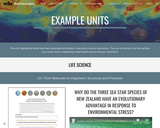
This is a lesson unit.
- Subject:
- Life Science
- Material Type:
- Unit of Study
- Author:
- Samantha Salvador
- Date Added:
- 07/24/2019


This is a lesson unit.

The Next Generation Science Standards (NGSS)* call for students to use the practices, concepts and content of science and engineering to understand phenomena and solve problems that are relevant to their lives. Starting from a student’s own experiences and community makes the science meaningful and increases engagement while helping students understand how global issues like climate change are present and addressable in their lives. In this series we examine how you can use the new science standards and your community to understand and address real world environmental problems and explore together how to integrate NGSS into your district’s classroom science units.Mapping neighborhood assets, opportunities, and problems can engage students more deeply in science and engineering. In this workshop you’ll learn how system models, looking for patterns, and observing change over time can help students investigate and map their community. Local ecosystems, water flow, and community assets are some of many possible areas for your mapping efforts. By the end of this workshop you’ll have strategies to use in mapping your community and ideas for how you can use the information gathered.

The Next Generation Science Standards (NGSS)* call for students to use the practices, concepts and content of science and engineering to understand phenomena and solve problems that are relevant to their lives. Starting from a student’s own experiences and community makes the science meaningful and increases engagement while helping students understand how global issues like climate change are present and addressable in their lives. In this series (NGSS in Action: Science and Engineering in your Schoolyard) we examine how you can use the new science standards and your community to understand and address real world environmental problems and explore together how to integrate NGSS into your district’s classroom science units.Workshop 1: Science in Action Description: "Venture outside the walls of the classroom to find local environmental phenomena that can anchor your classroom science unit. Explore with us the big picture of Next Generation Science Standards’ “three dimensional” science learning and then get hands on with the Science and Engineering Practices as you use them to build an understanding of an example phenomenon in our 'schoolyard.' You’ll leave this workshop with ideas and examples you can use in your own classroom science curriculum."
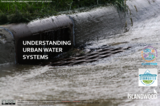
The Next Generation Science Standards (NGSS)* call for students to use the practices, concepts and content of science and engineering to understand phenomena and solve problems that are relevant to their lives. Starting from a student’s own experiences and community makes the science meaningful and increases engagement while helping students understand how global issues like climate change are present and addressable in their lives. In this series we examine how you can use the new science standards and your community to understand and address real world environmental problems and explore together how to integrate NGSS into your district’s classroom science units.Would you like to learn more about how urban water systems actually work? Are you curious how water systems, the impacts of climate change, and related conservation issues can interest your students and integrate with NGSS? Join us to learn about wastewater and stormwater systems (may include tours of facilities, depending on the site) and then workshop how you might use this content in your classroom. Appropriate for all 4th-12th grade teachers.
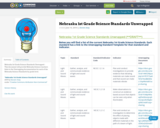
Nebraska 1st Grade Science Standards Unwrapped - This document will provide Nebraska Science teachers links to the Unwrapping documentation for each of the Nebraska Science Standards by grade level.
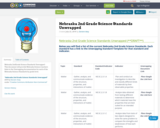
Nebraska 2ndGrade Science Standards Unwrapped - This document will provide Nebraska Science teachers links to the Unwrapping documentation for each of the Nebraska Science Standards by grade level.
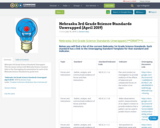
Nebraska 3rd Grade Science Standards Unwrapped - This document will provide Nebraska Science teachers links to the Unwrapping documentation for each of the Nebraska Science Standards by grade level.
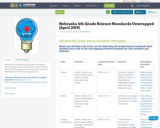
Nebraska 4th Grade Science Standards Unwrapped - This document will provide Nebraska Science teachers links to the Unwrapping documentation for each of the Nebraska Science Standards by grade level.
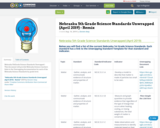
Nebraska 5thGrade Science Standards Unwrapped - This document will provide Nebraska Science teachers links to the Unwrapping documentation for each of the Nebraska Science Standards by grade level.
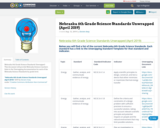
Nebraska 6th Grade Science Standards Unwrapped - This document will provide Nebraska Science teachers links to the Unwrapping documentation for each of the Nebraska Science Standards by grade level.
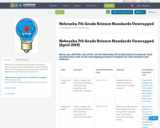
Nebraska 7th Grade Science Standards Unwrapped - This document will provide Nebraska Science teachers links to the Unwrapping documentation for each of the Nebraska Science Standards by grade level.
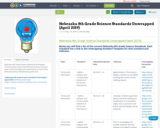
Nebraska 8th Grade Science Standards Unwrapped - This document will provide Nebraska Science teachers links to the Unwrapping documentation for each of the Nebraska Science Standards by grade level.
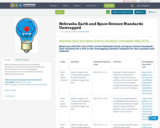
Nebraska Earth and Spave Science Standards Unwrapped - This document will provide Nebraska Science teachers links to the Unwrapping documentation for each of the Nebraska Science Standards by grade level.
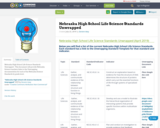
Nebraska High School Life Science Standards Unwrapped - This document will provide Nebraska Science teachers links to the Unwrapping documentation for each of the Nebraska Science Standards by grade level.
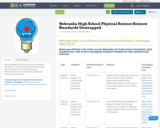
Nebraska High School Physical Science Standards Unwrapped - This document will provide Nebraska Science teachers links to the Unwrapping documentation for each of the Nebraska Science Standards by grade level.
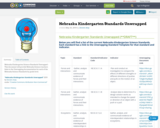
Nebraska Kindergarten Science Standards Unwrapped - This document will provide Nebraska Science teachers links to the Unwrapping documentation for each of the Nebraska Science Standards by grade level.
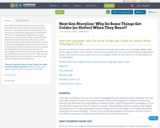
In this high school physical sciences unit, students investigate why some substances absorb heat when they react, while others release it. Students first solve the mystery of where the energy goes in endothermic reactions by examining salt dissolution and using magnets as models for bonds. They then expand their investigations to look into where the energy comes from in exothermic reactions. The model they continue to develop using magnets, helps them account for why breaking bonds absorbs energy from the surroundings and forming bonds releases energy back into the surroundings. The end of the unit naturally motivates a new question to pursue in future units, “Why are some types of particles more attracted to one another than others?"
nextgenerationstoryline.org

Through this lesson, students in 3rd-5th grade will understand how the human history of a local creek (Whatcom Creek in this example) affects the health of salmon populations. This lesson is an active way to engage students in graphing through the use of models and uses critical thinking to understand implications of human actions in the past and in the future.
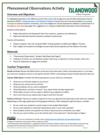
An adaptable exploratory and reflective activity that works with all ages and uses the Next Generation Science Standards (NGSS*), Asking Question and Defining Problems Practice and one of several possible Crosscutting Concepts to explore students’ awareness, prior knowledge and cultural experiences related to a phenomenon or Disciplinary Core Idea .
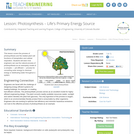
This lesson covers the process of photosynthesis and the related plant cell functions of transpiration and cellular respiration. Students will learn how engineers can use the natural process of photosynthesis as an exemplary model of a complex yet efficient process for converting solar energy to chemical energy or distributing water throughout a system.